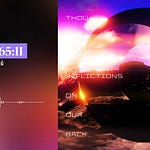Let their way become dark and slippery; and let the angel of the Lord pursue them. (Psalm 34:6 DR)
In the early mornings I generally try and go for a walk, which for me is a way to recollect my thoughts, pray, and prepare for the day ahead. In my neighborhood there are lots of sidewalks, and I have developed a fairly regular set of routes that I usually take such that I don’t have to pay too much attention to my surroundings. Because of this I can mostly proceed at a fairly brisk pace.
This, of course, changes dramatically in the winter when it snows, and even more so when it’s icy. The past few weeks it snowed pretty significantly and stayed below freezing for quite awhile, which meant that the sidewalks were pretty hit or miss as far as ice on them. Even for the ones that were shoveled it was often still fairly icy, and the days which did rise above freezing only melted some of the snow, which then immediately refroze by the morning.
Needless to say, walking has been a somewhat treacherous affair, and the times I have been able to venture out have required much more concentration on where I am going and where my feet are walking—especially in the early morning when it’s dark before the sun comes up—so that I don’t slip and fall on the ice.
The Psalmist calls to mind his enemies once more, entreating the Lord to make their way more arduous. In the previous passage there was the possibility of conversion, that the trials and temptations of life could be employed to bring them to repentance. This passage seems to reject such a reading, but—as will be seen—there still exists the probationary nature of this life, and sometimes what seems to be God’s judgment upon man is sometimes His mercy.
The Vulgate has fiat via illorum tenebræ et lubricum. Tenebræ means darkness or shadow and is often used for the darkness of night. There is in the Divine Office the office of Tenebræ during Holy Week at which Matins and Lauds are celebrated. As each Psalm is recited one of the candles is extinguished, until after the Benedictus all is left in darkness. It is during this time that the penitential Psalm 50 is recited, followed by the strepitus. There is an appropriate darkness here both physically and spiritually, as the candle representing Christ is hidden, leaving a sense of desolation in the darkness.
For us as humans for whom sight is so important, darkness is a situation full of peril. If we cannot see physically we are extremely vulnerable, and things like walking which are effortless in the day become much more difficult in the dark. In my own experience of walking in the early mornings, if the streetlights are out or I’m on a new route, it takes much longer to walk, as the obstacles which might normally present no difficulty now take on a new challenge.
The term lubricum is used for slippery, and English gets the the word lubricant or lubricate from this. The idea in lubricum is often more about the unsteady or unstable nature of the thing, and thus it is sometimes used in the sense of uncertain or fleeting. Much like trying to walk on an icy sidewalk, the way of the wicked is made to be slippery so that their feet cannot walk with certainty or speed.
However, it is not simply that the way is made dark and slippery—itself an undesirable combination—but also that the angel of the Lord now pursues them. The idea is thus that the wicked are trying to escape from the angel who pursues them, but the only path they can escape on is a dark and slippery one, with the conclusion being that they will not escape if they continue on this way:
Let their way be darkness and slipping. A horrible way! Darkness alone who fears not? A slippery way alone who avoids not? In a dark and slippery way how shall you go? Where set foot? These two ills are the great punishments of men: darkness, ignorance; a slippery way, luxury. And let the Angel of the Lord persecute them; that they be not able to stand. For any one in a dark and slippery way, when he sees that if he move his foot he will fall, and there is no light before his feet, haply resolves to wait until light come; but here is the Angel of the Lord persecuting them. These things he predicted would come upon them, not as though he wished them to happen. Although the Prophet in the Spirit of God so speaks these things, even as God does the same, with sure judgment, with a judgment good, righteous, holy, tranquil; not moved with wrath, not with bitter jealousy, not with desire of wreaking enmities, but of punishing wickedness with righteousness; nevertheless, it is a prophecy. (St. Augustine, Exposition on the Psalms, 34, 6.)
St. Augustine reads this as a prophecy of what will come to pass in respect to the enemies of the Psalmist. That is, the Psalmist is not desiring this absolutely of his enemies, but speaks of what will inevitably result if they persist in their wickedness. The treacherousness of this way is compounded by the darkening of the intellect which leads to ignorance, and also the pleasure of sin (that is, luxury) which makes falling into sin all the easier for the supposed good of the pleasures that it brings. Sin leads to further sin, which has a ratcheting effect, as it were, as it leads further and further from the truth and virtue, while the vengeance due to sin draws nearer and with greater intensity:
He ultimately asks that they should not only be scattered and compelled to fly but that they should be irremediably hurried on to destruction. Fugitives are favored by a knowledge of the way, by a safe and firm road; or, if the way be slippery, by moving slowly on it. He prays they may have no one of those things in their favor, but, on the contrary, that they may be obliged to fly in “the dark,” and on a “slippery” road, when both eyes and feet will be powerless; with the Angel of the Lord pressing on them so urgently that they must, of necessity, be utterly ruined. (St. Robert Bellarmine, A Commentary on the Book of the Psalms, 34, 6.)
St. Paul also develops this idea in terms of slavery to sin and slavery to righteousness. While a slave to sin one earns the recompense for sin, which is death:
For as you have yielded your members to serve uncleanness and iniquity, unto iniquity; so now yield your members to serve justice, unto sanctification. For when you were the servants of sin, you were free men to justice. What fruit therefore had you then in those things, of which you are now ashamed? For the end of them is death. But now being made free from sin, and become servants to God, you have your fruit unto sanctification, and the end life everlasting. For the wages of sin is death. But the grace of God, life everlasting, in Christ Jesus our Lord. (Romans 6:19-23 DR)
While a slave to sin man is on that dark and slippery road. As St. Augustine says, in our lives we would choose to wait until day to walk rather than risk a dark and slippery path, but sin darkens our intellects and impels us forward on that way, with every step a further descent into the tenebræ of iniquity (cf. Romans 1:24). The more we reject the truth and virtue and God Himself, the more we give ourselves over and are given over to our depravity, and in this manner the dark and slippery road becomes more treacherous and steep.
However, there can also be a mercy to this, for the very arduousness of walking in this way can be the means of grace by which we are awakened out of our stupor so as to come to repentance. Cassiodorus reads this passage as offering this moment of mercy:
He demanded that the situation of sinners be wholly arduous, so that their way, which seems to them clear and firm as they linger pleasurably upon it, may now become dark and slippery so that they cannot stand on it any longer. As the prophet Jeremias says: Therefore their way has become slippery in the dark: and they shall be thrown down and fall thereon. But if they decided to linger further in their evil ways, He asks that the Lord’s power pursue them, so that He may not cause them to cleave to their sins as they hasten to aspire after their own destruction. What a blessed proliferation of so many obstacles! How vehement is the prayer in this verse that the most salutary opposition be afforded them! (Cassiodorus, Explanation of the Psalms, 34, 6.)
It may be in the times of life when we face the most pressing obstacles and failures that there is the greatest opportunity for mercy. We often imagine that God’s favor is demonstrated to us when everything is easy and effortless, when we find success and do not face trials or severe temptations.
However, it may be in those moments that we should recollect ourselves and seriously consider the state of our souls. It could be that the relative smoothness of our lives in times of prosperity and success is actually a dark and slippery path upon which we might slip and fall. The ice of sin, so to speak, might be black ice, which is there but not readily apparent as the pleasures of this world can darken our intellects to the spiritual dangers which surround us.
On the other hand, the times of great suffering and struggle might be moments of great mercy, as we are allowed to perhaps see clearly the vanity of the goods and pleasures of this world, as well as the futility of our own ability to walk without faltering or slipping. God may put obstacles in our way to keep us from falling into destruction, to allow His grace the opportunity to pursue and catch up to us, so to speak, so that we might turn from the dark and slippery road and be brought to the grace of penance.
I used Trapcode Mir to create the flowing nature of this animation, and added in some lights to get the specular highlights so as to give it more of a slippery look. I kept it dark on the whole for obvious reasons, and used some big, bold type to create some nice contrast.
Enjoy.
Let their way become dark and slippery; and let the angel of the Lord pursue them.
(Psalm 34:6 DR)
View a higher quality version of this gif here:













Share this post